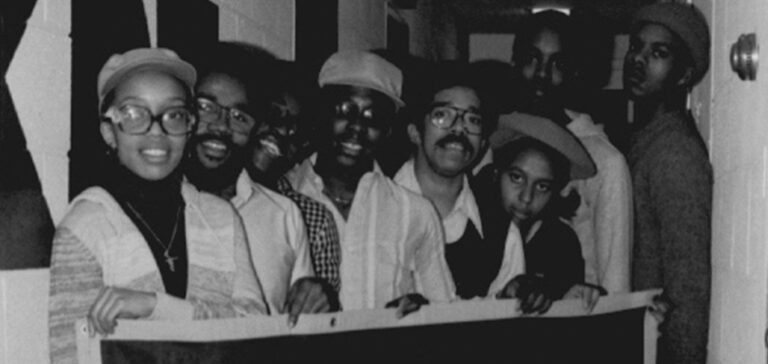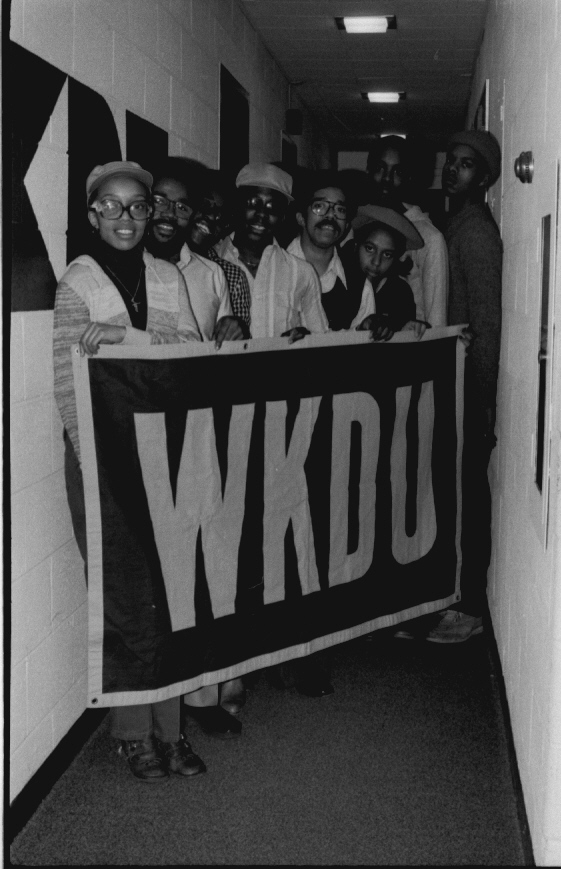
WDKU communicators from the ’70s. Courtesy Russell Jones.
The present form of Drexel’s student radio station — a voice for local and underground artists and student expression — emerged in 1971. That’s when the station switched from the AM dial to FM, and from WXDT 830 AM to WKDU 91.7 FM. With the new name and frequency came a shift in programming and a mission to serve the community. A year later, the new WKDU started a program unlike anything that had been heard before at the University — or on local and college radio.
“The Black Experience in Music” was created by five members of the University’s Black Student Union — four students and one senior-level Drexel administrator — to showcase content for and by members of the Black community. A story in the 1974 Lexerd said of the show: “Along with the best in today’s, yesterday’s and the future’s music, messages of community interests are an integral part of the format. The listening audience is, for the most part, people of the community who are not satisfied with the day in and day out exploitation of their culture.”
The broadcasters’ dedication to their listeners was so great that they referred to themselves as “communicators” — never DJs — to show their commitment to the format. Every Sunday through Monday, “The Black Experience” played everything from funk to R&B to jazz to spoken word, interspersed with interviews with local community members, journalists, musicians and many others.
Off the air, the communicators initiated several WKDU traditions that still exist in some form today, including radiothons to benefit nonprofits and anniversary alumni meetups. Most important, they gave air space for voices and stories to be heard. One such example was airtime they provided to “The Movement,” better known today as MOVE, the revolutionary back-to-nature organization that was subsequently the target of infamous police confrontations. “The Black Experience” was on air from the early ’70s to early ’80s and influenced a generation of students and their listeners.
When WKDU celebrated its 50th anniversary in July 2021, some former WKDU communicators returned to the air on Drexel’s station to play music, reminisce and conduct interviews. This fall, “The Black Experience” will once again join the station’s regular programming. Some of the original communicators will host the airwaves on a rotating schedule every Sunday from midnight until 2 p.m., with each week featuring a new crew. The reunion show can be heard via 91.7 FM or streamed online.
An exhibit of artifacts, photographs and documents capturing the station’s origins will be displayed by Drexel University Libraries & University Archives in the W. W. Hagerty Library atrium through December 31, 2021.
In honor of the station’s anniversary and the reunion event, Drexel Magazine invited “Black Experience” communicators from the era to share their memories and the importance of “The Black Experience” to not only WKDU’s history, but to Drexel and Philadelphia.
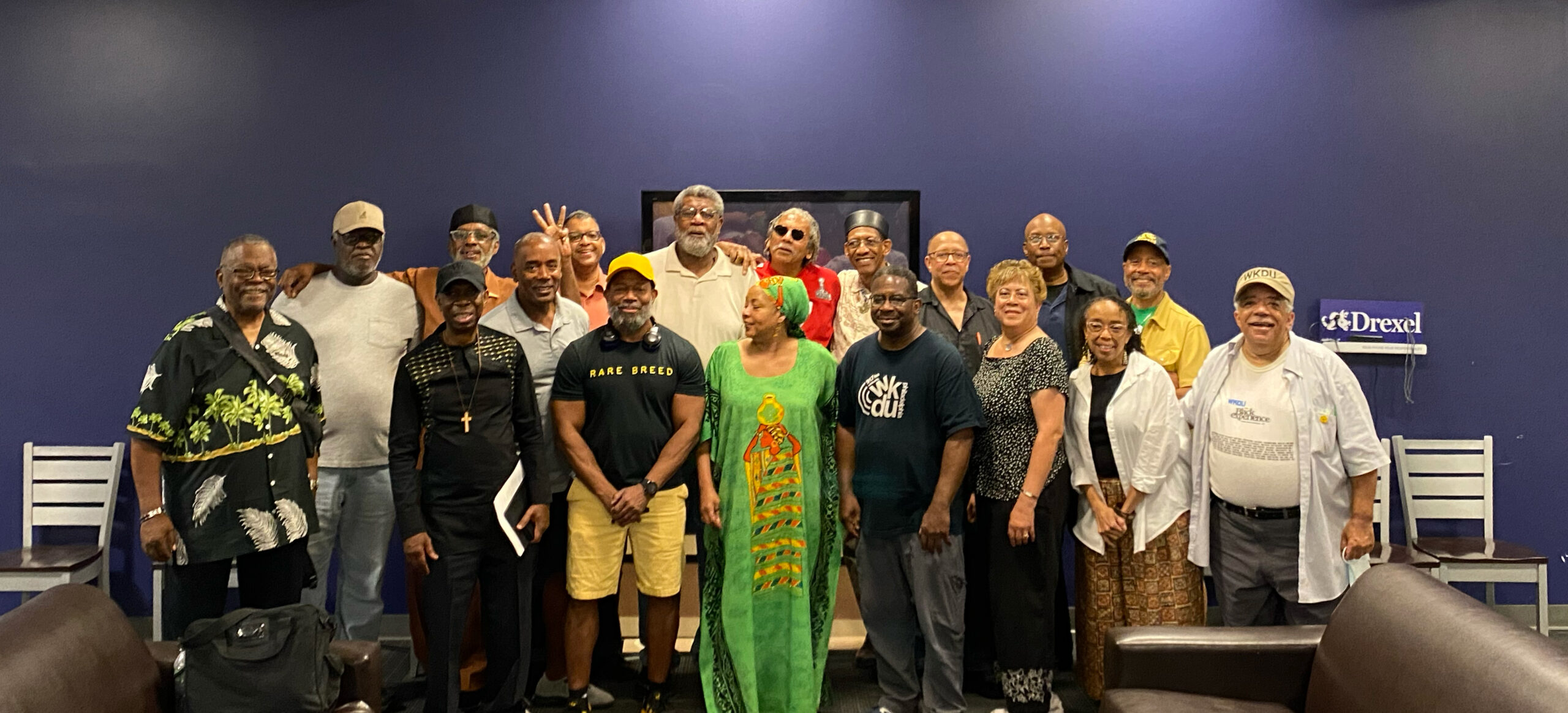
Former WKDU communicators returned to campus in July 2021 to celebrate WKDU’s 50th anniversary. Some archival “The Black Experience” shows were also aired during the station’s week-long birthday, and can be listened to here. Courtesy Derek Hengemihle.
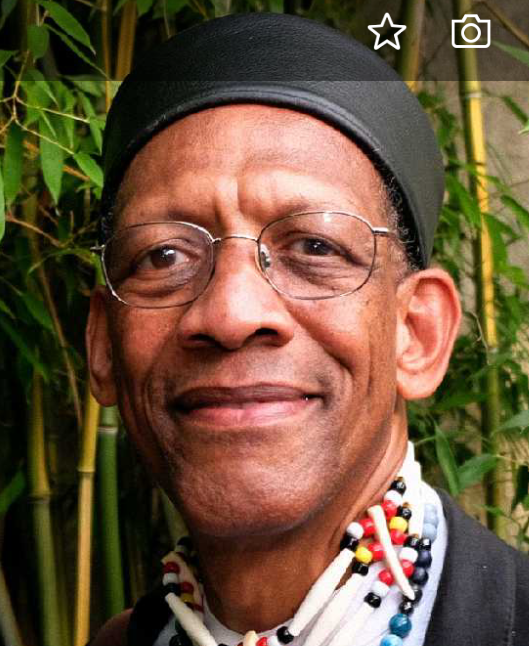

Warren E. Tuffy Merrick (BS business administration ’76)
Founding member of “The Black Experience in Music,” former WKDU station manager and 1974 radiothon coordinator, WKDU communicator from 1971 to 1976, and a student-athlete on Drexel’s football team. Pictured above in “now and then” photos.
…On how “The Black Experience” came to be at Drexel:
The catalyst and one of the co-founders of the “Black Experience in Music” was also the same University executive who moved Drexel to apply for and obtain its FCC Broadcast license. George Wilson was Drexel’s assistant vice president for student affairs, and even though students had for a few years wanted Drexel to get an FM broadcast license, it wasn’t until George exercised his mantle of leadership that the University actually applied for and obtained it.
So, in a sense, if it had not been for George Wilson and his interest in providing a unique radio experience for Drexel’s African American student body, the University may well have continued to be satisfied with its carrier current station, WXDT. [Editor’s Note: Merrick and Wilson were co-founders of “The Black Experience” along with Bill “Gunt” Gunter, BS C&E general studies ’72; Gregory “Bird” Moore; and Maurice “Bro. Stew” Stewart, BS business ’75.]
…On some of the show’s successes:
My favorite memories include establishing “The Black Experience in Music,” conceiving and implementing the strategy that allowed the expansion of the show beyond 2 p.m. Sunday afternoon, coordinating the 1974 Africare radiothon and our initial anniversaries, and doing my show, “The Aquarian Journey,” every Sunday from 10 a.m. to 2 p.m. from WKDU’s beginning until 1976.
After graduating from Drexel, I entered Temple University’s graduate program where I pursued a master’s degree in mass and international communication, with an emphasis on communications in Africa. While at Temple, I was hired as the first salaried program director for Temple’s jazz station, WRTI. Having coordinated WKDU’s most successful radiothon in 1974, the Africare radiothon [Editor’s note: It raised over $28,000 for the Africare nonprofit organization in 72 hours], I coordinated and implemented WRTI’s initial forays into listenership on the WKDU radiothon model.
Listen to a special edition of Merrick’s “The Aquarian Journey” from the WKDU 50th anniversary celebration originally broadcast on July 11 during the event:
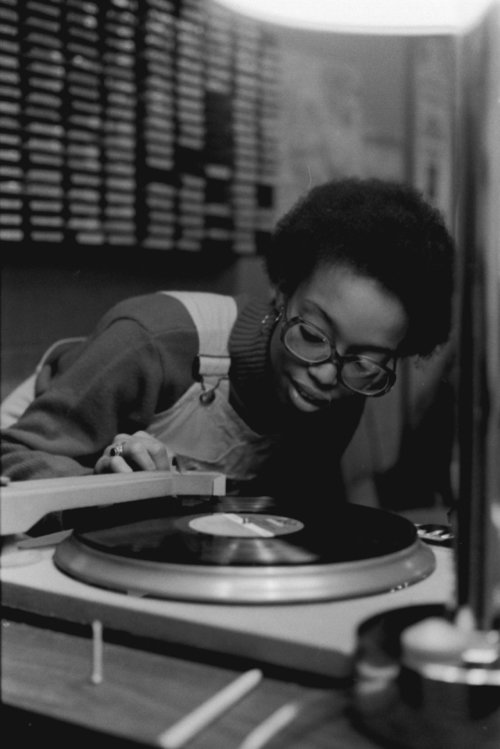
LaVerne Battiste. Courtesy Russell Jones.
LaVerne Battiste (BS design & merchandising ’83)
A WKDU communicator from 1976–78 and from 1981–83. Battiste initially delivered news for the Experience and later became a communicator in 1975 and public service director in 1976. She also planned three anniversaries. Pictured at left.
…On the cultural legacy of “The Black Experience:”
Because the ’70s and ’80s were a time of Black awareness in the world, “The Black Experience in Music” became an important entity in Philadelphia as well as on campus. “The Black Experience” became so much more than slots (we referred to them as phases) of music; it reached out to the Philadelphia community at large as well as to the Drexel community. Black people throughout the city appreciated having access to programming that spoke to their needs and preferences.
Listening to us on air, one would often hear the phrase, “The message is in the music, and the music is the message.” That’s because we considered our format to be progressive. Our music was a mix of traditional and contemporary jazz and R&B. Since new jazz music is generally not featured on mainstream media, it was a perfect fit for the non-commercial format at WKDU. When R&B musicians created music that spoke specifically to the Black struggle, pieces that were not always given proper airtime on commercial radio, that music definitely made its way onto our playlists. Additionally, works by artists of other genres, such as spoken word, were included — the Last Poets and Gil Scott-Heron come to mind.
…On the news and interviews shared through “The Black Experience:”
The news of the day was an important feature during our programming. Through the years we were able to add news segments, pre-recorded by professionals from mainstream radio stations who became integral members of “The Black Experience in Music” as contributors and as mentors in our midst. Their direction guided us as we endeavored to become a positive resource for our listeners.
These relationships netted us shows like “Black Times Audio,” which shared news and commentary on topics pertinent to the Black struggle; “Black Perspectives on the News,” which dealt with similar content with an emphasis on Philadelphia; and “News for Liberation,”written and produced by two Drexel students, one from Ghana and the other a Philadelphian, which brought us news from the African diaspora.
Another category of features rounding out our programming was public affairs and public service. Once again, we tapped the services of area professionals, although they frequently approached us with ideas.
Millersville University Psychology and African-American Studies professor Rita Smith-Wade-El brought us “Behind Black Faces” and “Daughters of Isis.” From Amelia Sechele (BS nutrition and food ’79) there was “Fruits from the Garden.” Harrison Ridley Jr. did a music history program during “Black Experience” time slots at the same time as his long-running jazz program on WRTI. And flight attendant Clara Lewis offered up a travel show.
On any given phase of “The Black Experience,” you were likely to hear an interview of someone from the community who was involved with some form of uplift for the people. We talked to all kinds of artists: musicians, dancers, writers, even comedians. We spoke to people in the news and making news: organizers, school heads, religious leaders. They came to us to get the word out on what they were doing, and we were receptive.
Vincent Coles (BS accounting ’77) interviewed the Rev. Jesse Jackson; Kathy Love approached [comedian and activist] Dick Gregory at an event and arranged for Amelia to interview him for her program; Russell Jones went to clubs, like the Bijou Café, and then stalked (not really!) musicians for interviews. He spoke to Billy Paul, Al Jarreau, Curtis Mayfield and Philadelphia jazz guitarist, Monnette Sudler, to name a few. Somebody brought Richard Pryor to the radio station and he recorded a promo for the show while he was there.
…On interacting with the community through events and celebrations:
So, alternative music, alternative news and perspectives, alternative public affairs and information — this is what we did on the weekends throughout the year. In the spring we put all these pieces together in one day and invited the public to join us for a celebration of the anniversary of “The Black Experience in Music.” And we had some great times here on the campus.
As I think back on this, it was a most extraordinary situation. I don’t think much of that could happen in these days and times, for various reasons, but things were very different then. We all came together for mutual edification and gratification. Artists were willing to accommodate us because our efforts throughout the year had been appreciated and we wanted to thank the community for their continued support. Drexel has never provided a budget for the radio station, as far as I know. Anyone who agreed to perform or speak at these annual gatherings did so for free. So, any band, singer, poet, dancer or dance group and any speaker performed or presented for no fee. “The Black Experience” also got together and prepared food for the first few of these gatherings.
At some point during my time at WKDU, and before one of the anniversaries, someone suggested that I do an African fashion show. I did the first presentation in 1978 and presented at other anniversaries as well. I used communicators as models and I think it provided the community with another opportunity to connect with the members of the show.
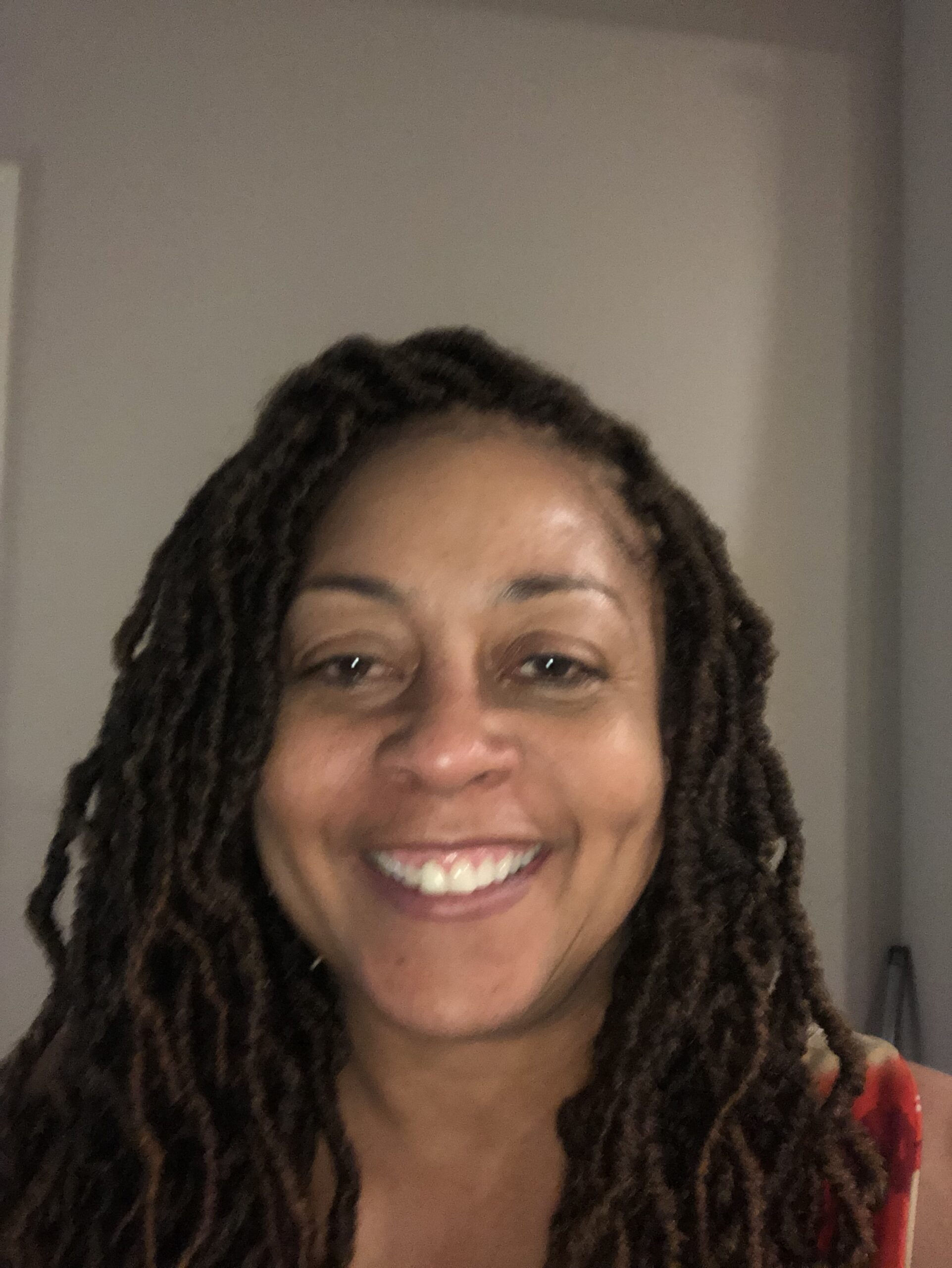
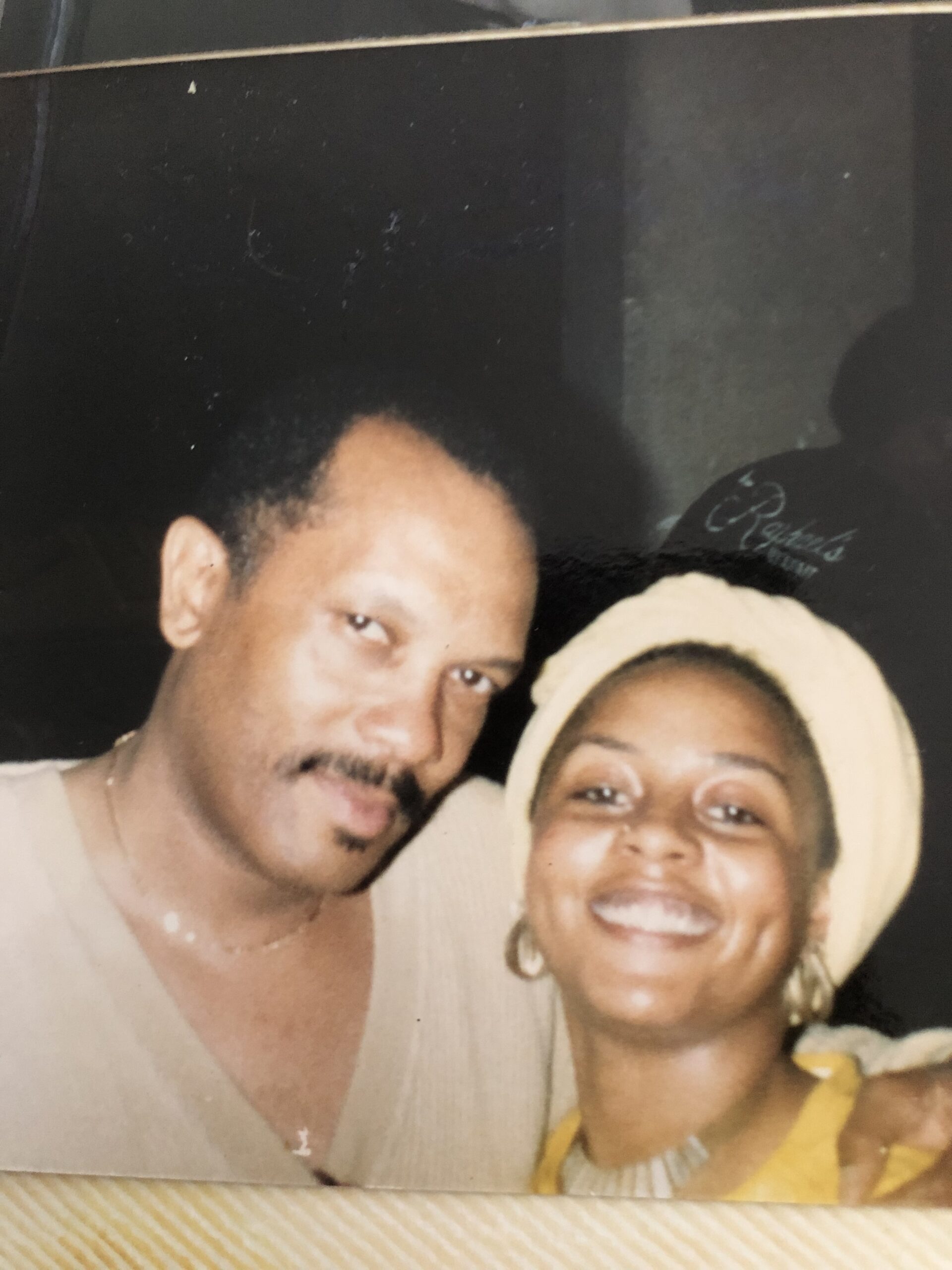
Sherri Pennington (attended ’77–’82; BS general studies ’03)
A WKDU communicator. Pictured in a current photo, and with jazz/R&B composer Roy Ayers.
…On why “The Black Experience” is a crucial part of WKDU’s legacy:
We were the only consistent programming for 38 hours every week (from midnight on Sunday until 2:15 p.m. on Monday) for 13 years (1971–1984)! Our listenership put WKDU on the map. The number of listeners grew every year because of the music that we played, outstanding informative interviews, a focus on local musicians and the educational/innovative/creative presentations for many programs that engaged the public. We were trailblazers who brought cultural awareness to constituents during turbulent times.
…On some of her many, many favorite memories:
…Being the MC for cultural events that occurred at several venues such as the AFCOM Learning Center. It was there that I met and spoke extensively with Maulana “Ron” Karenga, the founder of the Kawaida Institute of Pan-African Studies and creator of Kwanzaa.
…Being onstage with Nation of Islam’s Minister Louis Farrakhan, poet and professor Sonia Sanchez, activist Imari Obadele and other notables. As a poet myself, I was extremely excited to interview Sonia Sanchez for about 45 minutes at the station. It was an excellent interview and I still have it on cassette tape.
…Performing in an Afrikan fashion show at one of our anniversary celebrations and then photographed and featured in two scenes in the Philadelphia Tribune.
…Meeting Bob Marley on his tour bus! The other communicators had met him backstage. I missed that opportunity but immediately found his valet who asked if I wanted to meet him. I screamed yes! He took me to the tour bus and I ran straight to the back and hugged Bob Marley. I jokingly asked, “Where is the party at?” and he said, “You want a party then we’ll have a party.” The infamous Bob Marley invited me to the hotel somewhere in University City and [journalist and activist] Mumia Abu-Jamal, me and others hung out with the King of Reggae for a couple of hours until his lady friend, “Miss World” [Cindy Breakspeare], came in and took him away. What an awesome honor and time to be in his presence. He died a year later. I only realized Bob Marley’s importance and his impact in Jamaica, over the past 20 years.
…Meeting Gil Scott-Heron! I was so excited that I got on the El train going in the wrong direction. I still got the chance to meet him and spend time with him as did many of the other WKDU folks at his hotel room prior to his performance that evening. It was exhilarating!
…Another favorite memory is having the Last Poets at my house in North Philadelphia. My mother cooked dinner for all of us and we had a great time.
…Interviewing [musician and poet] Sun Ra at Grendel’s Lair, which was very interesting. Unfortunately, I left my recorder on the table while I went to the bathroom and somebody stole it! I was devastated.
…I also met and talked with [many musical artists including] Stevie Wonder, Angela Bofill, Horace Silver, Roy Ayers, Noel Pointer, Melba Moore, and Pieces of a Dream, who I helped introduce to the city of Philadelphia.
Listen to a special edition of Pennington’s “The Path/News for Liberation and Music,” co-hosted with “The Black Experience” alumnus Mawuna Gardesy from the WKDU 50th anniversary celebration originally broadcast on July 11 during the event:
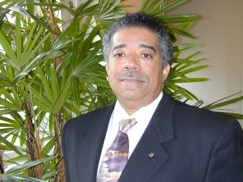
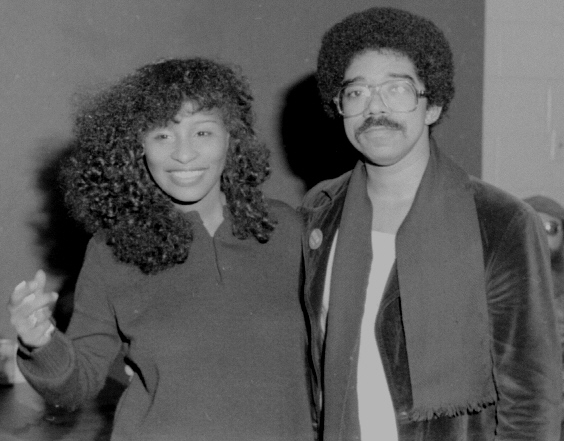
Russell Jones
Spent 10 years as a WKDU communicator from 1974 to 1984 while taking evening classes at Drexel. Pictured today, and with Chaka Kahn.
…On his first experiences with WKDU and “The Black Experience:”
In 1974, my younger brother made me aware of WKDU. He brought this to my attention since at the time he knew I was doing radio news, weather and sports at the Community College of Philadelphia (CCP) on a closed transmission (campus-only broadcast).
After listening to WKDU — “The Black Experience” — I went to their 1974 anniversary celebration. I went to see the voice I had listened to on the air: Christina (Tina) Waynes, the news director. Upon entering the radio station, I heard her on the air. When she exited from the on-air room, I introduced myself and she asked what I did. I told her I was broadcasting news but on a closed circuit and could she give me some pointers. She immediately took me by the hand and led me to where the radiothon was in progress. She introduced me to two personalities that not only did broadcasting segments on WKDU but were on-air personnel on two other commercial radios stations within the city. That was the last time I saw Tina Waynes because for the next 16 hours I was broadcasting with [legendary local radio host] E. Steven Collins and [journalist and activist] Mumia Abu-Jamal and others doing news and reporting on the radiothon.
That was my start on WKDU. After that I saw a lot of Tina Waynes and did news reporting for a couple of years at WKDU until I got my own show at 2 a.m. to 6 a.m. on Sundays. Through the years I have had many exciting adventures, not unlike my start at WKDU. Editor’s note: Russell Jones participated in an oral histories project conducted by former WKDU station manager Allison Durham (BS communication ’19, certificate writing and publishing ’19), and shared his photos of “The Black Experience” for WKDU’s 50th anniversary and “A History of WKDU 91.7.”
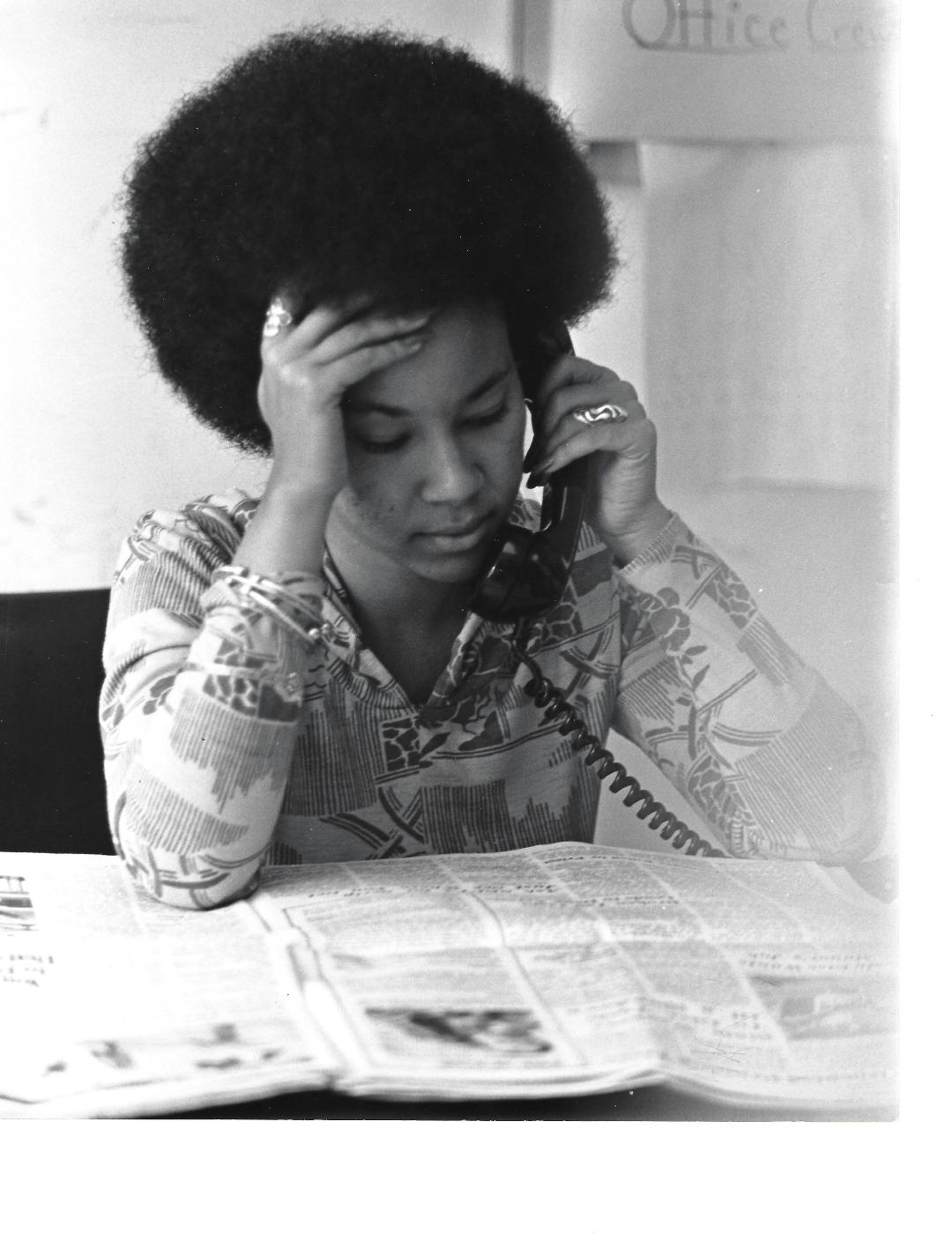
Tina Waynes, WKDU news director, 1973-74. Courtesy LaVerne Battiste.
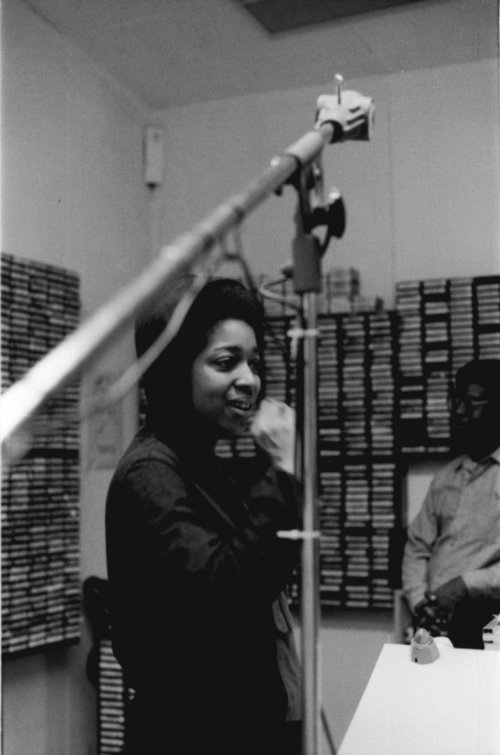
The late Rita Smith-Wade-El, who was a professor of psychology and African-American studies at Millersville University, recording one of her programs for WKDU. Courtesy LaVerne Battiste.
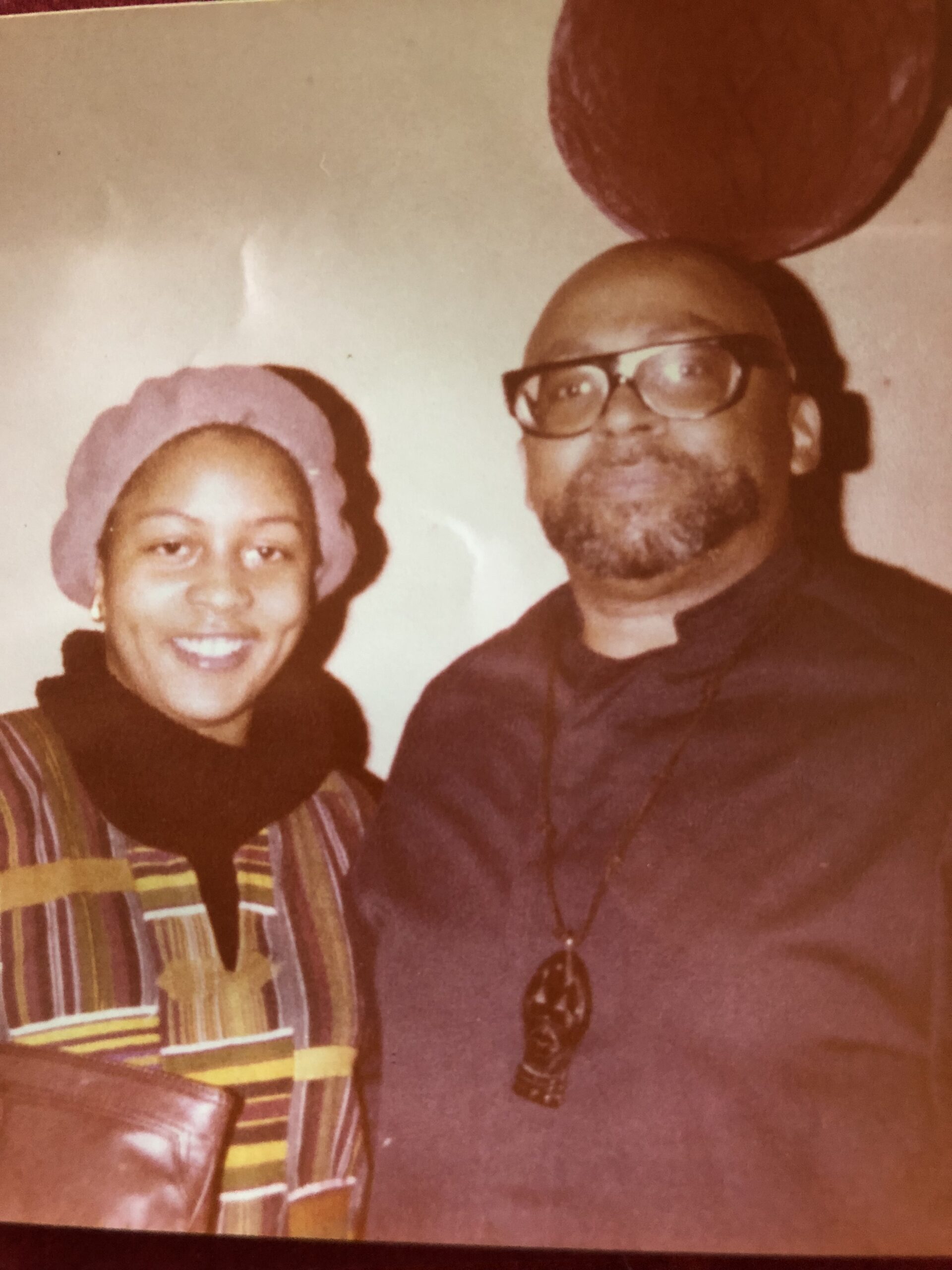
Sherri Pennington, with Maulana Ron Karenga, the Africana studies professor credited with creating Kwanzaa. Courtesy Sherri Pennington.
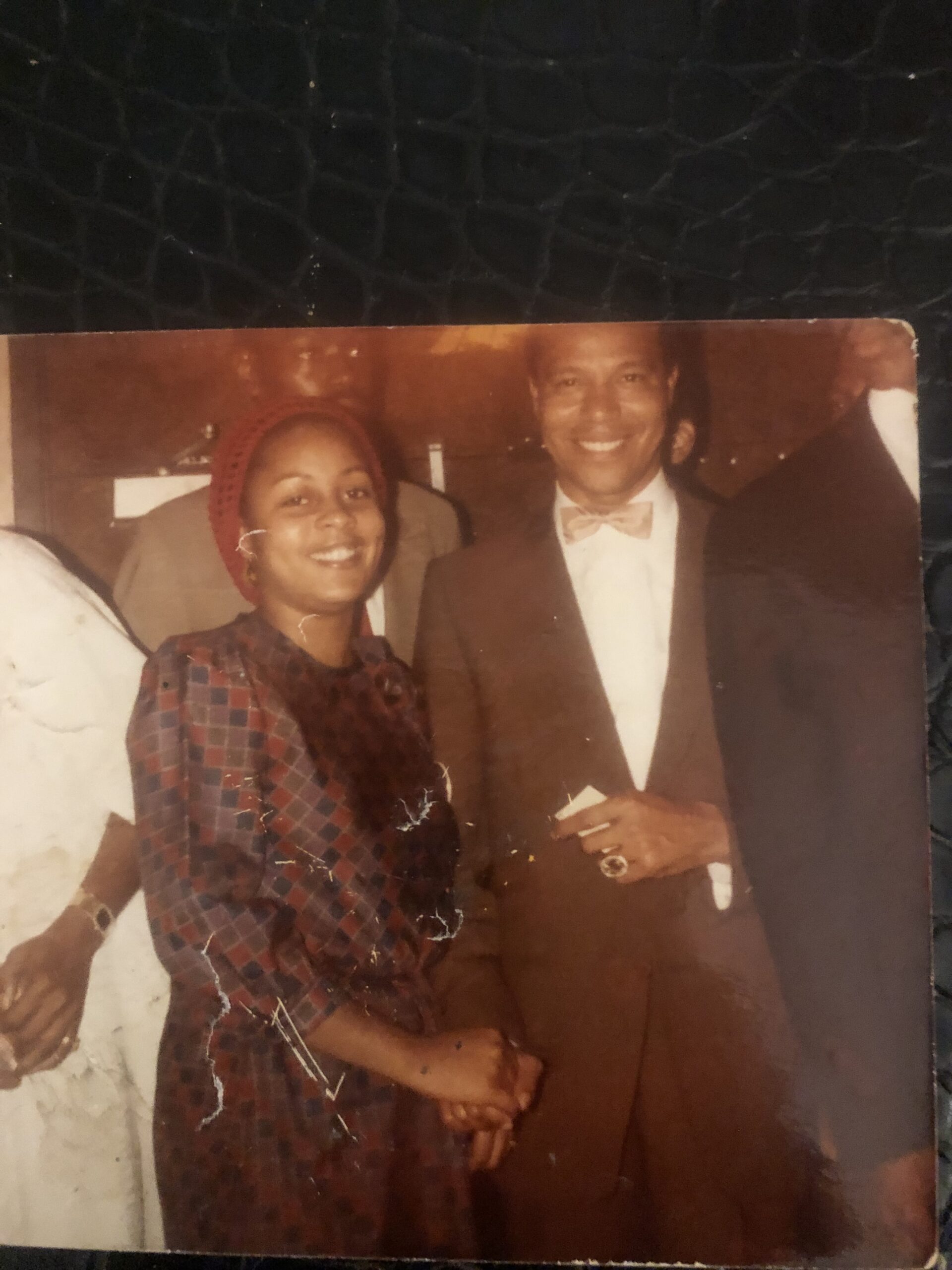
Sherri Pennington, with Nation of Islam’s Louis Farrakhan. Courtesy Sherri Pennington.
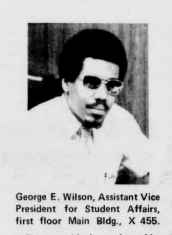
George Wilson was profiled in a “Freshman Guide to Drexel Administrators” in the Sept. 22, 1971, edition of The Triangle.
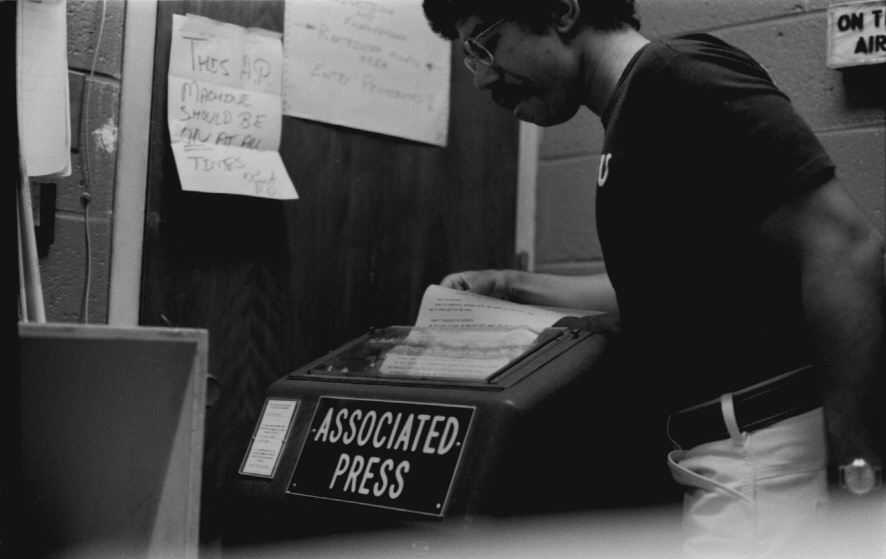
Russell Jones, handling news from the Associated Press. Courtesy Russell Jones.
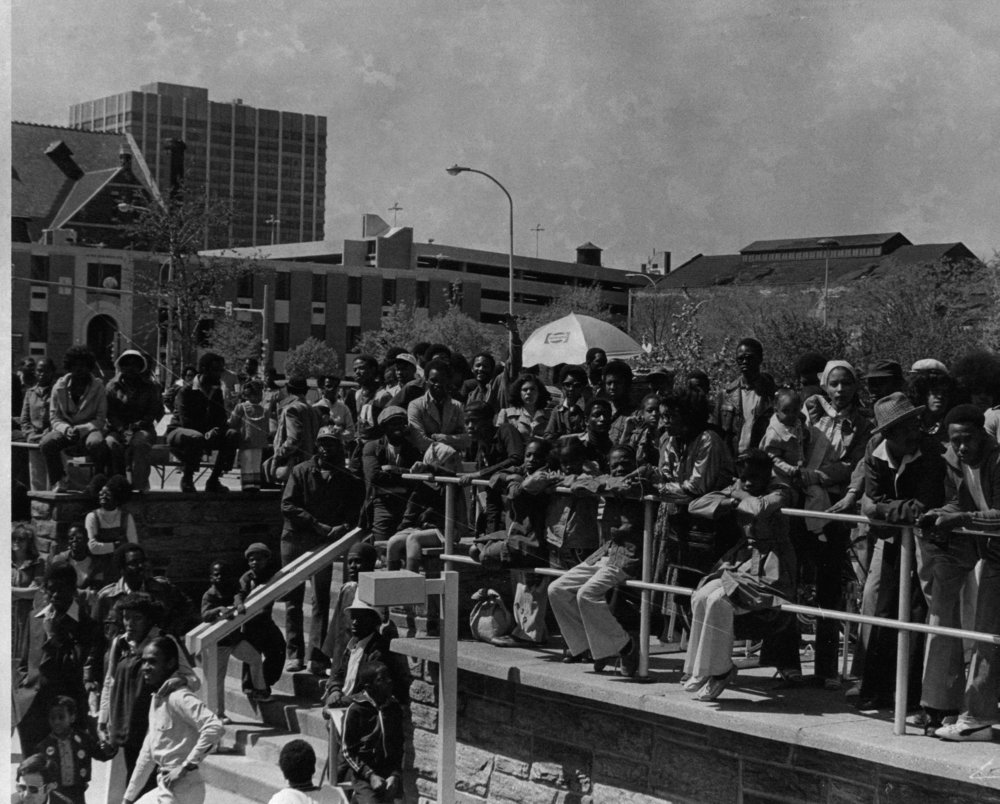
A crowd gathered on the ledge outside of Mandell Theatre to celebrate the 6th anniversary of “The Black Experience.” Courtesy LaVerne Battiste.
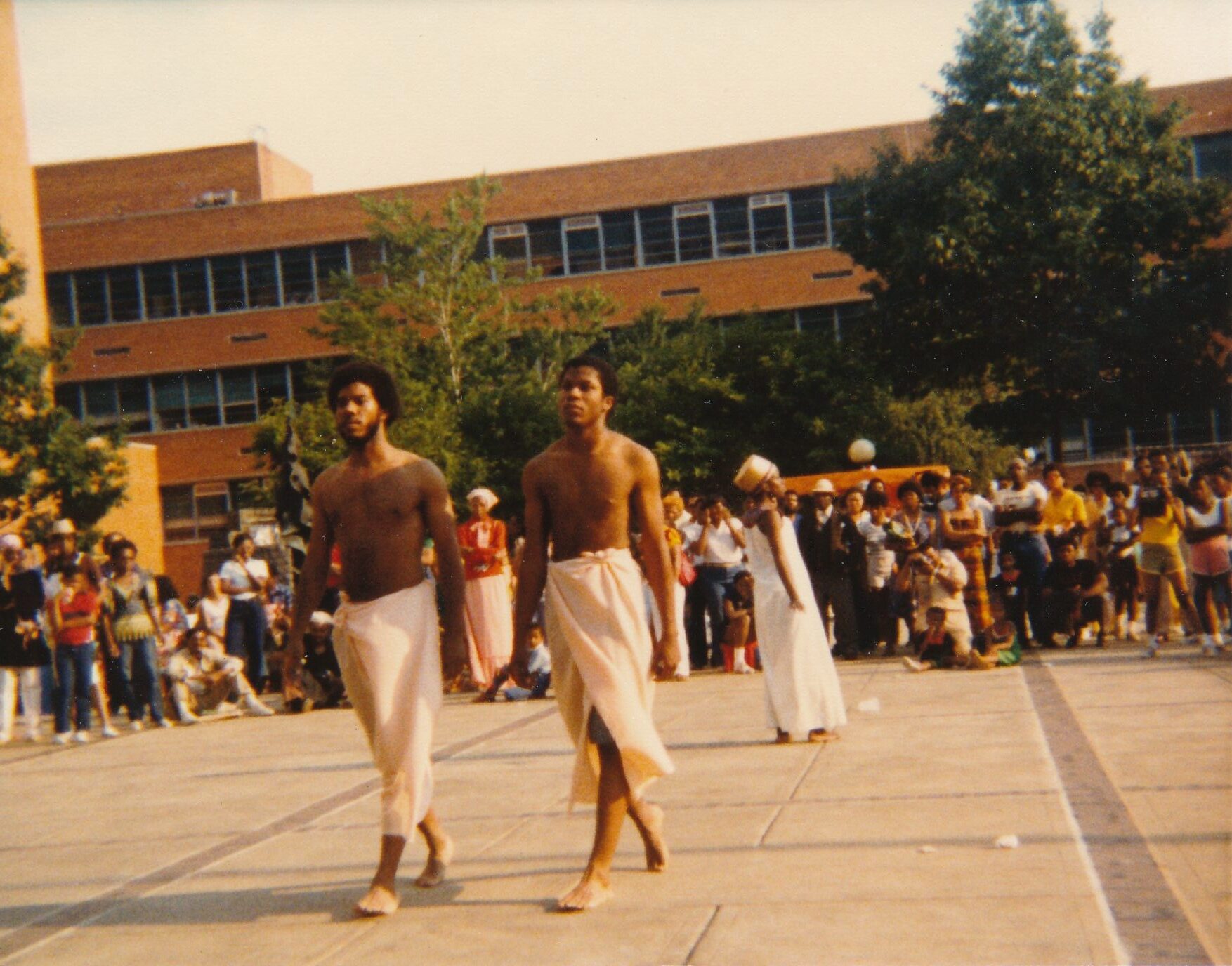
Scene from a 1975 African Fashion Show, which included “Experience” members as models. Courtesy LaVerne Battiste.
Support WKDU, the award-winning college radio station run entirely by students.


